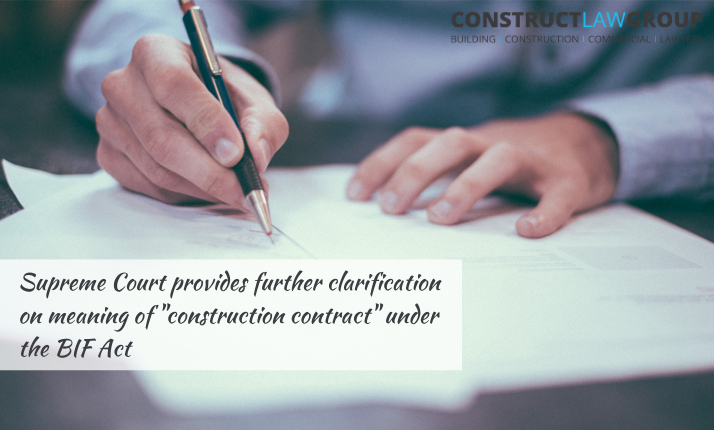Recent Supreme Court Decision confirms that an adjudication decision is void and of no effect where a valid “construction contract” does not exist.
The recent case of GCB Constructions Pty Ltd v SEQ Formwork Pty Ltd & Ors [2023] QSC 71 (GCB v SEQ) considered the validity of an adjudicator’s decision in circumstances where it was determined that an adjudicator had incorrectly found that an agreement between the parties was a “construction contract” under the Building Industry Fairness (Security of Payment) Act 2017 (Qld) (BIF Act). The judgement underscores the importance of assessing whether a contract falls within the definition of “construction contract” (under the BIF Act) and confirms that where that assessment was incorrectly founded to the extent that the contract does not meet the definition in the BIF Act, the adjudicator’s decision is void and has no effect.
Factual History
GCB Constructions Pty Ltd (GCB) was the head contractor for the construction of two (2) residential towers at Southport and subsequently engaged SEQ Formwork Pty Ltd (SEQ), a formwork contractor, to carry out work on site and supply materials in connection with that work during 2021 (Works). SEQ’s engagement and the works that followed are at the heart of the dispute.
In September 2020, SEQ provided a tender to GCB to carry out the Works. Following the tender, GCB issued SEQ a letter of award which was subject to agreement about “the terms and conditions of the AS4903-2000” (Proposed Subcontract). For the proceeding months, the parties entered into lengthy negotiations regarding the terms and conditions of the Proposed Subcontract, however failed to reach agreement resulting in the Proposed Subcontract remaining unsigned.
Following these negotiations, the parties acted on the assumption that they would reach an agreement on the terms and conditions of the Proposed Subcontract, and thereupon, SEQ undertook preliminary work for the Works. During this time, SEQ issued invoices for payment to GCB which were duly paid.
Payment claim in dispute
On 14 March 2022, SEQ issued a payment claim in relation to the preliminary works in the amount of $391,907.61 (Claim) which was for both labour and materials used in connection with the Works. GCB responded with a payment schedule that disputed “entitlement to any payment at this time” as GCB asserted that SEQ had “not performed work and supplied goods to the value being claimed”.
Following this, on 14 April 2022, SEQ lodged an adjudication application (Adjudication Application) for the Claim.
Adjudication Decision
On 17 May 2022, a decision was delivered in respect of the Adjudication Application which found, inter alia:
- the Works and Claim by SEQ were performed under a “construction contract” as it is defined in the BIF Act or in the alternative, the Works and Claim would be considered an “other arrangement” as contemplated by the definition of “construction contract’ in the BIF Act;
- an adjudicated amount of $367,124.39 awarded to SEQ; and
- GCB should pay 100% of the adjudicator’s fees.
Decision in GCB v SEQ
The Supreme Court considered whether the agreement found by the adjudicator amounted to a “construction contract” under the BIF Act and whether the tax invoice and associated schedules issued by SEQ amounted to a “payment claim” within the meaning of the BIF Act.
The Supreme Court ultimately found that the adjudicator was incorrect in determining that there was a “construction contract” or at least in the alternative, an “other arrangement” as contemplated by the definition of “construction contract” in the BIF Act given that the materials before the adjudicator could not justify the conclusion that there was a “construction contract” or “other arrangement”.
Relevantly, the definition of “construction contract” in the BIF Act is:
construction contract means a contract, agreement or other arrangement under which 1 party undertakes to carry out construction work for, or to supply related goods and services to, another party.
The Supreme Court went on to find that:
- in order to qualify as an “other arrangement” for the purpose of the BIF Act, there must be at least a “concluded state of affairs, which is bilateral”, and a sufficient degree of mutuality to serve the purposes for which the arrangement is required under the BIF Act, particularly having enough settled detailed to enable the Works to be claimed with precision and then valued to the same standard;
- the evidence before the adjudicator failed to establish anything more than GCB requesting SEQ to perform the Works without an agreement as to the charged hourly or daily rates;
- SEQ’s Claim was not valid given the absence of a relevant “construction contract” and in circumstances where the adjudicator’s decision is limited to only consider the provisions of the relevant “construction contract”, pursuant to section 88 of the BIF Act; and
- SEQ may have a claim in quantum meruit, but an agreement of the kind found by the adjudicator does not represent a contract which includes essential jurisdictional facts to engage the security processes under the BIF Act.
Message to contractors and subcontractors
The decision in GCB v SEQ highlights the importance of having a construction contract which meets the definition of “construction contract” under the BIF Act to enable contractors to benefits to the security of payment provisions.
Construct Law Group regularly draft, review and advise on construction contracts on behalf of principals and contractors. We also provide contract administration advice to ensure compliance with the BIF Act.
If you have any questions regarding contract reviews or would like us to assist with your current or future contract, please do not hesitate to contact our offices on (07) 3139 1874 or email us at info@constructlaw.com.au.
This article is provided for general information and educational purposes only and should not be taken to be legal advice. Each contract and set of facts are different and therefore you should obtain specific legal advice.




